Preparing for Your First Music Lesson
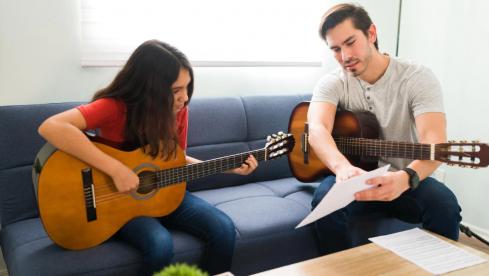
Whether you are a shy beginner student, or an out-going ‘ready to hit the ground running’ type of student, it’s best that you know how to approach your first music lesson so that you can get the most out of it. Let’s go through some of the ways you can prepare to help optimize your lesson.
1 – Get Inspired
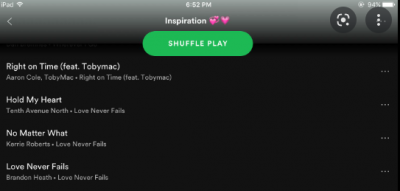 It’s assumed at this point that you enjoy music, which is at least part of the reason that you want to learn a musical instrument. While some take lessons to strengthen their attention and brain function, and others take lessons to improve dexterity, most will be taking lessons to learn some of the music that they love. So, take some of your favorite songs and put them in a Youtube/Spotify playlist, and listen to the playlist before going into your lesson. By amplifying your inspiration going into the lesson, you’ll be more prepared to focus, retain, and practice so that you can get closer to your goal of playing these songs that you love.
It’s assumed at this point that you enjoy music, which is at least part of the reason that you want to learn a musical instrument. While some take lessons to strengthen their attention and brain function, and others take lessons to improve dexterity, most will be taking lessons to learn some of the music that they love. So, take some of your favorite songs and put them in a Youtube/Spotify playlist, and listen to the playlist before going into your lesson. By amplifying your inspiration going into the lesson, you’ll be more prepared to focus, retain, and practice so that you can get closer to your goal of playing these songs that you love.
For me personally, I write my best film music after watching films with great scores. I produce my best electronic tracks when I stumble upon a new artist that gives me inspiration, or listen to the music that got me into electronic music in the first place. So whether you look for a new song to snare your interest, or bask in the nostalgia of the songs that gave you a love for music in the first place, listening to music before going into this first lesson can do you no wrong! Worst case, you feel totally stuck by this assignment, and you can discuss with your teacher that you’re looking for music to enliven your goals along the way, and if you’re found a great teacher, they’ll be able to help you find artists that will inspire you for years to come.
2 – Be Prepared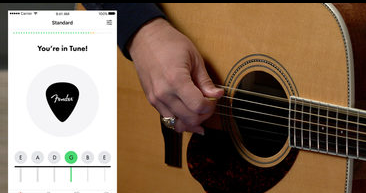
To be best prepared for your first music lesson, there’s just a couple of key things you’ll want to take note of. First, if you need to bring an instrument to the lesson (ie. Guitar, cello, etc), make sure the instrument is in good working condition. If you’re not sure if the instrument is in good working condition, it’s recommended that you have a player or technician of that instrument inspect it and give you their feedback. If your instrument is ready to go, be prepared to potentially tune it once you arrive. If you don’t know how, this could be a great thing to address in this first lesson, as it will be a common recurrence before you practice, play, or have a lesson, so it’s worth knowing well.
So you have a working instrument, that’s tuned, what’s next? Be sure to get to your lesson early. Teachers often block off many time slots to various students throughout their day, so if you’re late to a lesson it’s very unlikely that the teacher will be able to go over the lesson time slot allotted for you. Unexpected heavy traffic, road conditions, and other factors can lead to arriving to a lesson later than expected, so it’s best to prepare to arrive early, so that if you are behind schedule you’re still on time.
Lastly, you must bring a notebook. You’ll use this notebook to keep track of all of your assigned homework/practice. It may also be a good idea beforehand to ask the teacher if they prefer digital or pencil and paper note taking. Many of our teachers use Google Docs, especially for virtual lessons, but some teachers still prefer to use pencil and paper for in-person note taking. For digital notes, usually all you need is an email address to access the note, and from there it’s recommended to bookmark the note within your browser so that you can easily access it.
3 – Get Ready to Chat
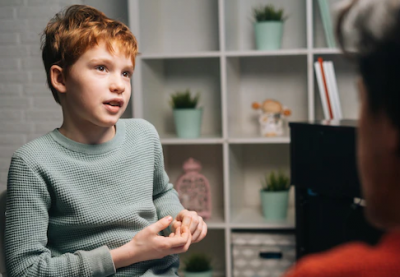 Your teacher should be asking you some questions within the first lesson to help them best navigate their approach toward your lessons. They will need to know your previous experience and level on the instrument, as well as your experience within music but outside of the instrument they are teaching you. For example, 5 years of previous choir experience can greatly help a new piano student.
Your teacher should be asking you some questions within the first lesson to help them best navigate their approach toward your lessons. They will need to know your previous experience and level on the instrument, as well as your experience within music but outside of the instrument they are teaching you. For example, 5 years of previous choir experience can greatly help a new piano student.
You should have an idea of what your goals on the instrument are. Do you want to be technically proficient and improve your dexterity, or do you want to have a dense catalog of your favorite songs ready to play at a moments notice? Alternatively, you may need an RCM grade to fulfill entrance requirements to a post-secondary institute, or you may wish to be able to improvise and understand music theory on a deeper level. Whatever the goals may be, it’s best that you let your teacher know from day one so that they don’t spend time on areas of music that you find uninteresting and unfulfilling. As a disclaimer, sometimes we DO need to practice areas of music that are slightly outside of our interests to get towards the goals that we are more passionate about (ie. Learning technique to be a better improviser), but a good teacher should take this into consideration and balance the lessons accordingly.
Also, let the teacher know what an average week looks like in your life, so that they can a lot an appropriate amount of practice time, and possibly also set up a practice schedule in the near future. During your practice time is when you’ll do most of your learning and acquire most of your muscle memory, so the importance of practice can’t be undersold. So, from the get-go, let your teacher know how much time you can set aside so that they can properly fill your practice time with a manageable amount of work.
4 – Get Ready to Play
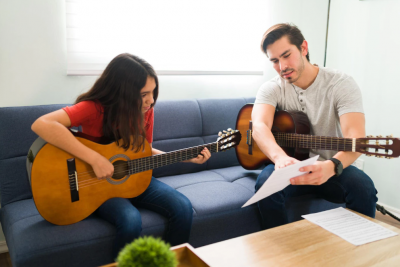 It is very common that during a first lesson a student will have to do some playing on their instrument. This is either to break the ice and simply get a student comfortable with the most basic technical practice on that instrument, or to demonstrate their ability on the instrument if they are continuing to advance their studies. If you are brand new to the instrument, just be prepared to try something totally new and be open-minded to the process. If you are a continuing student, it’s a good idea to have 2 contrasting pieces ready to play (or some technique-based material) to show the teacher what level you are currently playing at. From there, leave it to your teacher to help you set a good pace for your lessons and to know what level to place you so that you can feel comfortable in these first lessons with them.
It is very common that during a first lesson a student will have to do some playing on their instrument. This is either to break the ice and simply get a student comfortable with the most basic technical practice on that instrument, or to demonstrate their ability on the instrument if they are continuing to advance their studies. If you are brand new to the instrument, just be prepared to try something totally new and be open-minded to the process. If you are a continuing student, it’s a good idea to have 2 contrasting pieces ready to play (or some technique-based material) to show the teacher what level you are currently playing at. From there, leave it to your teacher to help you set a good pace for your lessons and to know what level to place you so that you can feel comfortable in these first lessons with them.
5 – Practice Proper Etiquette
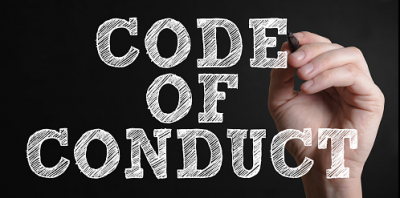 This topic is quite dense, and while certain rules are day-to-day expectations (no spitting in lessons) and others can be assumed (don’t have wet marker on your hands), other areas are more nuanced. This is why at Cook Music School we have a clear code of conduct that you can view here. Every school may have their own variations on their code of conduct, so it’s recommended that you view the rules of your school so that you can properly set expectations towards your actions within a private lesson setting.
This topic is quite dense, and while certain rules are day-to-day expectations (no spitting in lessons) and others can be assumed (don’t have wet marker on your hands), other areas are more nuanced. This is why at Cook Music School we have a clear code of conduct that you can view here. Every school may have their own variations on their code of conduct, so it’s recommended that you view the rules of your school so that you can properly set expectations towards your actions within a private lesson setting.
6 – Pandemic Precautions
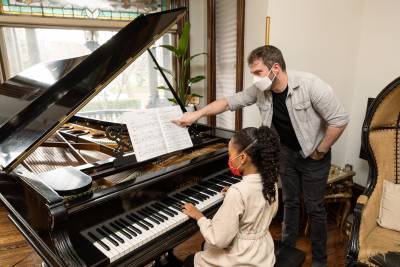 Having students wash their hands before a lesson has been an expectation even before the pandemic, but it is more important now than ever. This is especially true on a shared instrument like piano. While many teachers will disinfect the piano keys between lessons, it’s still best practice for students to wash up or at least sanitize before they get playing on a shared keyboard. Even guitarists benefit from washing their hands before playing their instrument, despite not sharing their instrument, as dirty hands can lead to quicker wear and tear on their strings.
Having students wash their hands before a lesson has been an expectation even before the pandemic, but it is more important now than ever. This is especially true on a shared instrument like piano. While many teachers will disinfect the piano keys between lessons, it’s still best practice for students to wash up or at least sanitize before they get playing on a shared keyboard. Even guitarists benefit from washing their hands before playing their instrument, despite not sharing their instrument, as dirty hands can lead to quicker wear and tear on their strings.
Also, having an appropriate mask on in the waiting area and during the lesson is often preferred to help stop the spread of COVID, especially during waves of the virus. In-person lessons can often be in close quarters, so following proper mask protocols is especially important during these lessons. If you aren’t sure what proper mask protocol is, be sure to check out this relevant article here, or research the expectations within your country.
7 – Virtual Lesson Expectations
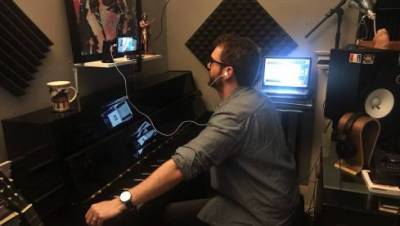
Here at Cook Music School, many of our students have opted for virtual lessons. It’s important to know how to best navigate this lesson environment, which is why we’ve created a separate blog dedicated to explaining the approach and best practices for this lesson medium (focused on piano). Feel free to check out that blog here. While much of the information within this blog is universal among all instruments, it’s also a good idea to review with your teacher how to best optimize online lessons for your particular instrument.
8 – Get Practicing
Once you’ve completed your first music lesson, be sure to set time aside to practice in between lessons. This often comes in the form of setting up a practice schedule with your teacher. By establishing a good practice routine within the first two weeks, you will be starting to setup habits that will help your learning grow exponentially as you develop as a musician. Just remember, consistency is key!
Cook Music School is always looking for ways to improve our resources for students, so if you’d like to see any sections added to this blog, please feel free to contact us here.
